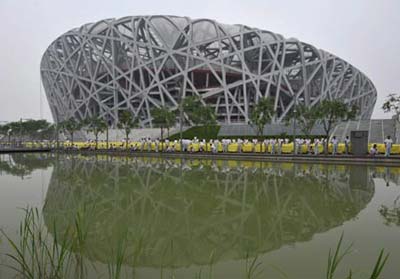 Performers who will perform during the opening ceremony of Beijing Olympics wait before a rehearsal at the National Stadium, also known as the "Bird's Nest", in Beijing July 11, 2008. [Agencies]
Performers who will perform during the opening ceremony of Beijing Olympics wait before a rehearsal at the National Stadium, also known as the "Bird's Nest", in Beijing July 11, 2008. [Agencies]
Since being awarded the 2008 Games seven years ago, Beijing has engaged in an aggressive effort to clean up the capital's air pollution and ease traffic on the clogged highways. The city has spent nearly more than US$15 billion on anti-pollution measures such as moving factories and adding subway.
The latest move was taking 300,000 high-emission cars off its roads early this month and Beijing also announced that private cars will be banned on alternate days from July 20, depending on whether their number plates end in odd or even numbers.
The International Olympic Committee (IOC) has warned it may reschedule endurance events to remove a potential health risk but now the fears seem to be dwindling amid the continual improvement of the air quality.
The earthquake has taken off much of the country's festive mood towards the Games, but will in no way take away China's enthusiasm for hosting the Beijing Games.
People lined the torch relay routes, unfurling the national and Olympic flags and shouting "Go China Go" and "Go Olympics Go".
"Holding the Olympics is a century-long dream for the Chinese, and we have been preparing and looked forward to it since July 13, 2001," said Deng Yaping, a four-times Olympic table tennis gold winner when she visited the children in the quake areas.
"We have taught the children a lot about the Olympics in the last seven years, and the kids have already known about the Olympic spirit - higher, faster, stronger," added Deng, now a Beijing Olympic official preparing the Olympic village. "They really like the Fuwa (mascot) we give them, and we hope that they never give up in life and pursue their best."
Besides, various campaigns aimed at improving the behavior of local citizens finally turned the tide. More and more people are getting to abandon bad habits like spitting, not queuing up, smoking anywhere, swearing in Beijing dialect and littering.
A survey released by Renmin University of China in February found that in 2007, 2.54 percent of people still spat, roughly a half of the figure for 2006, and the occurrence of littering in public dropped from 5.3 percent in 2006 to 2.86 percent in 2007 and queue-jumping from 6 percent to 1.5 percent.
(Xinhua News Agency July 13, 2008)